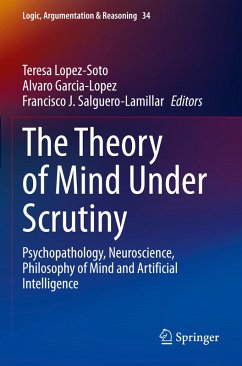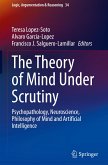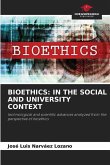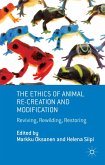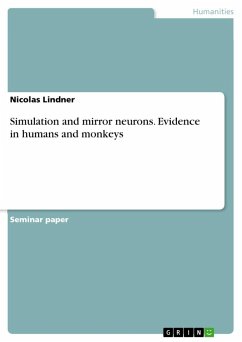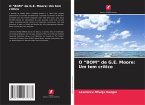The Theory of Mind Under Scrutiny
Psychopathology, Neuroscience, Philosophy of Mind and Artificial Intelligence
Herausgegeben:Lopez-Soto, Teresa; Garcia-Lopez, Alvaro; Salguero-Lamillar, Francisco J.
The Theory of Mind Under Scrutiny
Psychopathology, Neuroscience, Philosophy of Mind and Artificial Intelligence
Herausgegeben:Lopez-Soto, Teresa; Garcia-Lopez, Alvaro; Salguero-Lamillar, Francisco J.
- Broschiertes Buch
- Merkliste
- Auf die Merkliste
- Bewerten Bewerten
- Teilen
- Produkt teilen
- Produkterinnerung
- Produkterinnerung
This book is a call to expand and diversify our approach to the study of the human mind in relation to the Theory of Mind. It proposes that it is necessary to combine cross-disciplinary methods to arrive at a more complete understanding of how our minds work. Seeking to expand the discussion surrounding the Theory of Mind beyond the field of psychology, and its focus on our capacity to ascribe mental states to other people, this volume collects evidence and research to point to a more holistic understanding of our own minds, the minds of others, behavior, language, and reasoning.
This book…mehr
Andere Kunden interessierten sich auch für
![The Theory of Mind Under Scrutiny The Theory of Mind Under Scrutiny]() The Theory of Mind Under Scrutiny104,99 €
The Theory of Mind Under Scrutiny104,99 €![BIOETHICS: IN THE SOCIAL AND UNIVERSITY CONTEXT BIOETHICS: IN THE SOCIAL AND UNIVERSITY CONTEXT]() Jose Luis Narvaez LozanoBIOETHICS: IN THE SOCIAL AND UNIVERSITY CONTEXT29,99 €
Jose Luis Narvaez LozanoBIOETHICS: IN THE SOCIAL AND UNIVERSITY CONTEXT29,99 €![Ambivalences of Creating Life Ambivalences of Creating Life]() Ambivalences of Creating Life38,99 €
Ambivalences of Creating Life38,99 €![Ethics under the Aspect of Constructive Realism Ethics under the Aspect of Constructive Realism]() Friedrich WallnerEthics under the Aspect of Constructive Realism10,00 €
Friedrich WallnerEthics under the Aspect of Constructive Realism10,00 €![The Ethics of Animal Re-Creation and Modification The Ethics of Animal Re-Creation and Modification]() The Ethics of Animal Re-Creation and Modification38,99 €
The Ethics of Animal Re-Creation and Modification38,99 €![Simulation and mirror neurons. Evidence in humans and monkeys Simulation and mirror neurons. Evidence in humans and monkeys]() Nicolas LindnerSimulation and mirror neurons. Evidence in humans and monkeys16,95 €
Nicolas LindnerSimulation and mirror neurons. Evidence in humans and monkeys16,95 €![O ¿BOM¿ de G.E. Moore: Um tom crítico O ¿BOM¿ de G.E. Moore: Um tom crítico]() Lawrence Ofunja KangeiO ¿BOM¿ de G.E. Moore: Um tom crítico36,99 €
Lawrence Ofunja KangeiO ¿BOM¿ de G.E. Moore: Um tom crítico36,99 €-
-
-
This book is a call to expand and diversify our approach to the study of the human mind in relation to the Theory of Mind. It proposes that it is necessary to combine cross-disciplinary methods to arrive at a more complete understanding of how our minds work. Seeking to expand the discussion surrounding the Theory of Mind beyond the field of psychology, and its focus on our capacity to ascribe mental states to other people, this volume collects evidence and research to point to a more holistic understanding of our own minds, the minds of others, behavior, language, and reasoning.
This book therefore illuminates the conceptual intricacy underlying the Theory of Mind. It posits that a wide scope is necessary to make a breakthrough in scientific research towards a full understanding of the nature, function, and development of our capacity to converge on biological processes of the brain towards consciousness, emotion, awareness, and cognition. The volume presents methods, results, critiques, and models intended to provoke debates in various academic disciplines. It is of interest to scholars working in psychology, neuroscience, philosophy of mind, and artificial intelligence.
This book therefore illuminates the conceptual intricacy underlying the Theory of Mind. It posits that a wide scope is necessary to make a breakthrough in scientific research towards a full understanding of the nature, function, and development of our capacity to converge on biological processes of the brain towards consciousness, emotion, awareness, and cognition. The volume presents methods, results, critiques, and models intended to provoke debates in various academic disciplines. It is of interest to scholars working in psychology, neuroscience, philosophy of mind, and artificial intelligence.
Produktdetails
- Produktdetails
- Logic, Argumentation & Reasoning 34
- Verlag: Springer / Springer Nature Switzerland / Springer, Berlin
- Artikelnr. des Verlages: 978-3-031-46744-8
- Seitenzahl: 760
- Erscheinungstermin: 3. Januar 2025
- Englisch
- Abmessung: 235mm x 155mm x 41mm
- Gewicht: 1130g
- ISBN-13: 9783031467448
- ISBN-10: 3031467442
- Artikelnr.: 72728635
- Herstellerkennzeichnung
- Springer Nature c/o IBS
- Benzstrasse 21
- 48619 Heek
- Tanja.Keller@springer.com
- Logic, Argumentation & Reasoning 34
- Verlag: Springer / Springer Nature Switzerland / Springer, Berlin
- Artikelnr. des Verlages: 978-3-031-46744-8
- Seitenzahl: 760
- Erscheinungstermin: 3. Januar 2025
- Englisch
- Abmessung: 235mm x 155mm x 41mm
- Gewicht: 1130g
- ISBN-13: 9783031467448
- ISBN-10: 3031467442
- Artikelnr.: 72728635
- Herstellerkennzeichnung
- Springer Nature c/o IBS
- Benzstrasse 21
- 48619 Heek
- Tanja.Keller@springer.com
Teresa Lopez-Soto - Tenure Professor at the Department of English Language and Main Researcher at the Laboratory of Speech and Phonetic Sciences, University of Seville. Adjunct Faculty at the Institute for the Empirical Study of Language, University of Ohio and at the School of Medicine, Complutense University of Madrid. Main areas of research: neurophysiological and electrophysiological methods in language, language pathologies, psychopathology, clinical linguistics and computational linguistics. ÁLVARO GARCÍA LÓPEZ he was born in Madrid, Spain, in 1986. He received the B.S. degree in industrial electronics technical engineering, the M.S. degree in industrial electronics, and the Ph.D degree in electronic engineering from the Carlos III University of Madrid, in 2010, 2016 and 2022 respectively. From 2006 to 2021, he worked in different electronics and quality companies. Since 2017, he has been a Researcher with the Displays and Photonic Applications Group, Carlos III University and since 2021, the Spanish Center for Captioning and Audio Description (CESyA). He has been teaching as Associated Professor in Carlos III University since 2020. He is currently with CESyA in Madrid, Spain. He has authored 3 reports, one of them awarded the prize for the best scientific dissemination video of the year 2020 by IEEE Access, 5 international conferences and one patent. José Francisco Salguero Lamillar - Full Professor of General Linguistics at the Department of Spanish Language, Linguistics and Theory of Literature of the University of Seville. Founding member of the Research Unit on Logic, Language and Information - Andalucía Tech (UILLI-AT). Main research areas: Semantics and Meaning Theory, Formal Grammars, Cognition, Knowledge Representation and Language, Non-Classical Logics.
Part 1. Fundamental Issues in ToM and new Perspectives.- 1. Interdisciplinary Debates and Approaches on ToM, AI, and Language (Sergio Marín Conejo).- 2. An introduction to Theory of Mind: Fundamental Concepts and Issues (Miriam Rivero-Contreras, David Saldaña and Martina Micai).- 3. A Mental Files Theory of Mind: How Children Represent belief and its Aspectuality (Michael Huemer).- Part 2. Pathologies Associated with ToM.- 4. Theory of Mind and Reading (Pablo Delgado and Isabel R. Rodríguez-Ortiz).- 5. Theory of Mind and Psychopathology: A comprehensive Assessment and an Overview of Impairments in Neuropsychiatric Disorders (Pilar de la Higuera-González, Alejandra Gálvez-Merlín, Elisa Rodríguez-Toscano, Jorge Andreo-Jover, and Alejandro de la Torre-Luque).- 6. Theory of Mind in Autism: from a Primary Deficit to just Mutual Misunderstanding? (Gema Erena-Guardia, and Mila Vulchanova and David Saldaña).- 7. Theory of Mind after Acquired Brain Injury: basic Aspects, Evaluation, and Intervention (Inés Abalo-Rodríguez, Jesús Cabrera-Álvarez, Sandra Doval, Alberto Fernández Lucas, and Dolores Villalobos).- 8. Theory of Mind in Children who are Deaf: the Importance of Early Language and Conversational Access (Kimberly Peters and David B. Pisoni).- 9. Analyzing the Dynamics between Theory of Mind, Speech Disorders, and Language Rewiring in Aphasia (Teresa Lopez-Soto).- 10. Sleep and its Disorders: when ToM is not awake (Montes-Latorre & Porcacchia).- 11. Hypothalamus-Pituitary-Adrenal (HPA) Axes and Relationship with Stress, Mood, Personality, and Neurocognitive Functioning (Ana María Martínez Robayo).- Part 3. ToM from the Perspective of Philosophy of Mind.- 12. What we are for us, what we are for Others: Consciousness and Identity (Pilar López Segura, Tomás Ortiz Alonso).- 13. The Mind-body Problem: an Overview of Proposed Solutions (Javier Alejandro Galadí).- 14. Do I Really Believe that? A Mind-reading Account of Belief Self-ascription (Sylvain Montalvo).- 15. Study of the Theory of Mind (ToM) through the Japanese Philosophy (Diego López-García, Diego Lopez-Luque, Walter Federico Gadea-Aiello, Emilio José Delgado-Algarra).- 16. Content and Process in the Brain. Implications for Clinical and Educational Approaches (Carlos M. Gómez, Brenda Y. Angulo-Ruiz, Elena I. Rodriguez-Martínez , Francisco J. Ruiz-Martínez, Eva María Padilla Muñoz, María Dolores Lanzarote Fernández).- Part 4. ToM from the perspective of Language.- 17. Language, Mind, and thought: a General Overview (Inmaculada Aguilar-Ponce).- 18. Relations between Bilingualism and Theory of Mind. A Neurologic Challenge: from the Bilingual Advantage to a New Assessment of Conclusions (Priscila Sánchez Soriano).- 19. Processes of Early Language Acquisition and its Implications for Theory of Mind in Autistic Children (Mayuresh Kumar).- 20. Gendered Theory of Mind: A Linguistic and Literary Approach (Sergio Marín Conejo, Teresa Lopez-Soto).- Part 5. ToM fromthe Perspective of Artificial Intelligence.- 21. Data-Driven vs. Model-Driven Approaches in Cognitive Speech Processing (Pedro Gómez-Vilda, Andrés Gómez-Rodellar).- 22. The Social Machine: Artificial Intelligence (AI) Approaches to Theory of Mind (Alberto Nebreda, Danylyna Shpakivska-Bilan, Carmen Camara and Gianluca Susi).- 23. Theory of Mind in Artificial Intelligence applications (Alvaro Garcia-Lopez).
Part 1. Fundamental Issues in ToM and new Perspectives.- 1. Interdisciplinary Debates and Approaches on ToM, AI, and Language (Sergio Marín Conejo).- 2. An introduction to Theory of Mind: Fundamental Concepts and Issues (Miriam Rivero-Contreras, David Saldaña and Martina Micai).- 3. A Mental Files Theory of Mind: How Children Represent belief and its Aspectuality (Michael Huemer).- Part 2. Pathologies Associated with ToM.- 4. Theory of Mind and Reading (Pablo Delgado and Isabel R. Rodríguez-Ortiz).- 5. Theory of Mind and Psychopathology: A comprehensive Assessment and an Overview of Impairments in Neuropsychiatric Disorders (Pilar de la Higuera-González, Alejandra Gálvez-Merlín, Elisa Rodríguez-Toscano, Jorge Andreo-Jover, and Alejandro de la Torre-Luque).- 6. Theory of Mind in Autism: from a Primary Deficit to just Mutual Misunderstanding? (Gema Erena-Guardia, and Mila Vulchanova and David Saldaña).- 7. Theory of Mind after Acquired Brain Injury: basic Aspects, Evaluation, and Intervention (Inés Abalo-Rodríguez, Jesús Cabrera-Álvarez, Sandra Doval, Alberto Fernández Lucas, and Dolores Villalobos).- 8. Theory of Mind in Children who are Deaf: the Importance of Early Language and Conversational Access (Kimberly Peters and David B. Pisoni).- 9. Analyzing the Dynamics between Theory of Mind, Speech Disorders, and Language Rewiring in Aphasia (Teresa Lopez-Soto).- 10. Sleep and its Disorders: when ToM is not awake (Montes-Latorre & Porcacchia).- 11. Hypothalamus-Pituitary-Adrenal (HPA) Axes and Relationship with Stress, Mood, Personality, and Neurocognitive Functioning (Ana María Martínez Robayo).- Part 3. ToM from the Perspective of Philosophy of Mind.- 12. What we are for us, what we are for Others: Consciousness and Identity (Pilar López Segura, Tomás Ortiz Alonso).- 13. The Mind-body Problem: an Overview of Proposed Solutions (Javier Alejandro Galadí).- 14. Do I Really Believe that? A Mind-reading Account of Belief Self-ascription (Sylvain Montalvo).- 15. Study of the Theory of Mind (ToM) through the Japanese Philosophy (Diego López-García, Diego Lopez-Luque, Walter Federico Gadea-Aiello, Emilio José Delgado-Algarra).- 16. Content and Process in the Brain. Implications for Clinical and Educational Approaches (Carlos M. Gómez, Brenda Y. Angulo-Ruiz, Elena I. Rodriguez-Martínez , Francisco J. Ruiz-Martínez, Eva María Padilla Muñoz, María Dolores Lanzarote Fernández).- Part 4. ToM from the perspective of Language.- 17. Language, Mind, and thought: a General Overview (Inmaculada Aguilar-Ponce).- 18. Relations between Bilingualism and Theory of Mind. A Neurologic Challenge: from the Bilingual Advantage to a New Assessment of Conclusions (Priscila Sánchez Soriano).- 19. Processes of Early Language Acquisition and its Implications for Theory of Mind in Autistic Children (Mayuresh Kumar).- 20. Gendered Theory of Mind: A Linguistic and Literary Approach (Sergio Marín Conejo, Teresa Lopez-Soto).- Part 5. ToM fromthe Perspective of Artificial Intelligence.- 21. Data-Driven vs. Model-Driven Approaches in Cognitive Speech Processing (Pedro Gómez-Vilda, Andrés Gómez-Rodellar).- 22. The Social Machine: Artificial Intelligence (AI) Approaches to Theory of Mind (Alberto Nebreda, Danylyna Shpakivska-Bilan, Carmen Camara and Gianluca Susi).- 23. Theory of Mind in Artificial Intelligence applications (Alvaro Garcia-Lopez).

